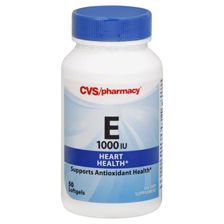Top Class Actions’s website and social media posts use affiliate links. If you make a purchase using such links, we may receive a commission, but it will not result in any additional charges to you. Please review our Affiliate Link Disclosure for more information.

Plaintiff Ronda Kaufman pleaded with the First Circuit Monday to revive the lawsuit, telling the panel of judges that a lower court misinterpreted her state-law claims alleging that CVS misled consumers about the supplement’s ability to fight heart disease and improperly dismissed the case.
“Study after study after study over the past decade has shown that vitamin E supplementation offers no health benefits,” Kaufman’s attorney told Circuit Judges Juan Torruella, William J. Kayatta Jr. and David J. Barron. “That statement is objectively false.”
This is the first of several lawsuits pending across the country over allegations about the health benefits, or lack thereof, of vitamin E to reach the appellate level.
Filed by Kaufman in May 2014 on behalf of a proposed nationwide Class of consumers who purchased vitamin E pills from the drug store chain and subclasses for customers in Rhode Island and New York, the CVS lawsuit alleges that the store brand vitamin E labels are misleading to customers, making them think the vitamins could reduce the risk of heart disease.
Kaufman asserts that she purchased CVS vitamin E 400 IU Softgels (100 count) at a New York CVS, believing the supplement would “provide the promised heart health benefits” as indicated by the product’s label
The soft gel bottles, carried at 7,600 CVS stores nationwide contain the statement “Vitamin E helps maintain healthy blood vessels and promotes heart health.” However, Kaufman says she was misled by CVS’ statements that its vitamin E products would reduce her risk of heart disease when they allegedly do not.
Kaufman’s claims are based on a selection of seven medical journals referenced in her complaint and the contention that other studies reportedly show that vitamin E provides no heart health benefits.
CVS successfully motioned to dismiss the proposed class action lawsuit earlier this year, stating that Kaufman’s claims were moot since she failed to plead a false or fraudulent act since the label carries a disclaimer that the vitamin E supplement is not intended to cure or prevent disease.
The pharmacy chain also stated that Kaufman’s references to several medical studies are without merit since the referenced vitamin E studies are “generally either epidemiological, flawed, or are findings that occurred by chance.”
At the core of the case is whether or not Kaufman’s is making a “disease” claim, meaning that the vitamin E labeling indicates that the supplement could fight heart disease or if it is a “structure and function” claim describing how the product actually works.
In her appeal brief to the First Circuit, Kaufman contends that the lower court’s interpretation of the “disease” claim and a “structure and function” claim was taken incorrectly.
Kaufman states that U.S. District Judge Mary M. Lisi misinterpreted her reference to several medical studies to mean that Kaufman’s complaint was a “disease” complaint when it was in fact intended to support a structure and function claim.
Any benefit “would manifest itself in studies on cardiovascular health,” Kaufman’s lawyer said. “There’s absolutely no cardiovascular benefit.”
But CVS’ counsel told the panel “She [Kaufman] said she believed it would reduce heart disease.”
First Circuit Judge Barron asked counsel for CVS if the pharmacy chain could technically describe the structure and function of the vitamin E supplement on its packaging in a way that would be misleading to a customer.
“They pointed to that studies suggesting that even though it doesn’t cure disease, it also harms you,” Judge Barron stated. “How can a label saying this is good for heart health be other than misleading?”
“If it was harmful, the FDA wouldn’t let them sell it,” said CVS’ attorney, arguing: “And it’s not what she alleges. She said, I bought it thinking it was going to reduce my risk of cardiovascular disease, and it didn’t.”
Kaufman is represented by Brian Penny of Goldman Scarlato & Penny P.C.
The CVS Vitamin E Class Action Lawsuit is Kaufman, et al v. CVS Caremark Corp., et al., Case No. 16-1199 in the First Circuit Court of Appeals.
ATTORNEY ADVERTISING
Top Class Actions is a Proud Member of the American Bar Association
LEGAL INFORMATION IS NOT LEGAL ADVICE
Top Class Actions Legal Statement
©2008 – 2024 Top Class Actions® LLC
Various Trademarks held by their respective owners
This website is not intended for viewing or usage by European Union citizens.














